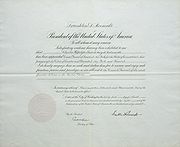
Exequatur
Encyclopedia

International relations
An exequatur is a patentLetters patent
Letters patent are a type of legal instrument in the form of a published written order issued by a monarch or president, generally granting an office, right, monopoly, title, or status to a person or corporation...
which a head of state
Head of State
A head of state is the individual that serves as the chief public representative of a monarchy, republic, federation, commonwealth or other kind of state. His or her role generally includes legitimizing the state and exercising the political powers, functions, and duties granted to the head of...
issues to a foreign consul
Consul
Consul was the highest elected office of the Roman Republic and an appointive office under the Empire. The title was also used in other city states and also revived in modern states, notably in the First French Republic...
, guaranteeing the consul's rights and privileges of office and ensuring recognition in the state
Sovereign state
A sovereign state, or simply, state, is a state with a defined territory on which it exercises internal and external sovereignty, a permanent population, a government, and the capacity to enter into relations with other sovereign states. It is also normally understood to be a state which is neither...
to which the consul is appointed to exercise such powers. If a consul is not appointed by commission
Letters patent
Letters patent are a type of legal instrument in the form of a published written order issued by a monarch or president, generally granting an office, right, monopoly, title, or status to a person or corporation...
, the consul receives no exequatur; the government will usually provide some other means to recognize the consul. The exequatur may be withdrawn, but in practice, where a consul is obnoxious, an opportunity is afforded to his government to recall him.
Roman Catholic Canon Law
An exequatur is a legal instrument issued by secular authorities in Roman Catholic nations to ensure that Papal teachings have legal force within their jurisdiction. The tradition began during the time of the Western SchismWestern Schism
The Western Schism or Papal Schism was a split within the Catholic Church from 1378 to 1417. Two men simultaneously claimed to be the true pope. Driven by politics rather than any theological disagreement, the schism was ended by the Council of Constance . The simultaneous claims to the papal chair...
, when the legitimately elected Pope gave secular leaders permission to verify the authenticity of papal degrees before enforcing them.
Some dissidents in the church claim however that the tradition arose because of the state's inherent power of the church and that such state privilege in reviewing Papal teachings was exercised since the early days of the church. However, official church teaching denies that any permission from secular officials was necessary for Papal pronouncements to be legally effective, though local officials sometimes failed to enforce the law.

